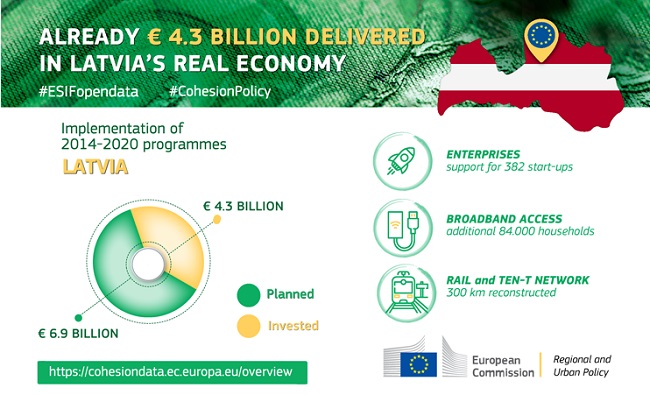Analytics, Economics, EU – Baltic States, Forum, Modern EU
International Internet Magazine. Baltic States news & analytics
Friday, 09.01.2026, 14:29
Comprehensive EU strategy to target urgent regional challenges
 Print version
Print version |
|---|
The EUSBSR forum will take place in Gdansk, Poland during
12-13 June. In the welcoming address to the 10th jubilee Forum, Mieczysław Struk, Marshal of the Pomorskie Voivodeship underlined that
both the organizers and the participants would not only finalise the main strategy’s
achievements but also “pave the way for smarter, more efficient and better
coordinated actions aiming at prosperous future for the Baltic Sea Region”. And
this future is closely connected to the states around the Baltic Sea
involvement in sustainability.
Citation from: https://strategyforum2019.eu/10th-annual-forum-of-the-eusbsr
Short history
The EU Strategy for the Baltic Sea Region, EUSBSR was endorsed by the European Council in October 2009 in response to key challenges facing the region, which countries on their own could not efficiently resolve. The strategy provides for a focused macro-regional framework for improving cooperation around three main objectives: “saving the sea”, i.e. protection ecological and environmental condition of the Baltic Sea; “connect the region”, i.e. mainly through energy and transport cooperation; and “increase prosperity”, i.e. through cooperation in health, innovation, education, culture, tourism, etc. The states-participants of the EU Strategy for the Baltic Sea Region are: Denmark, Estonia, Finland, Germany (with five northern regions), Latvia, Lithuania, Poland, Sweden, as well as Norway.
Jointly-agreed strategy’s action plan includes
a number of policy areas and horizontal actions accompanied by concrete
flagships and clearly identified targets.
The Strategy
helps to mobilise all relevant EU funding and policies and coordinate the
actions of the EU countries, regions, pan-Baltic organisations, financing
institutions and non-governmental bodies to promote a more balanced development
of the Baltic Sea Region.
On the EU
strategies and policies see: https://ec.europa.eu/info/strategy_en
During a decade, the member states intensely worked on about
15 priority areas and 80 concrete “flagship projects” within four main sectors:
environment, prosperity, accessibility, as well as safety and security.
Besides, there is also a so-called “Northern Dimension”, a
common EU policy involving the EU states, Russia, Norway and Iceland in providing
external cooperation in the Strategy.
Hence, the main
achievements for a decade include:
- Support for new projects: e.g. in
cooperation with member states’ farmers to reduce Baltic Sea’s
eutrophication and improved planning for transport infrastructure;
- Greater involvement of regional
states (including non-EU countries) in such priority areas as
environmental protection, water quality, research and innovation;
- Improved cooperation between and
among regions and other partners, including private, public sectors and
civil society.
On European macro-regional cooperation
European macro-regional strategy is a policy framework which
allows countries located in the same region to jointly tackle and find
solutions to problems or to better use the potential they have in common (e.g.
pollution, navigability, worldwide business competition, innovation, etc.). By
doing so, they benefit from strengthened cooperation by making their policies
more efficient than if they had addressed these issues in isolation.
Presently, there are four EU macro-regional strategies (each
is accompanied by an action plan regularly updated) facing emerging needs and
challenges: for the Baltic Sea region, the EUSBSR in 2009, for the Danube
Region (2010), for the Adriatic and Ionian Region (2014), and the strategy for
the Alpine Region in 2015.
The EU macro-regional strategies are supported by EU funds,
including the Regional and European Structural and Investment funds.
Source: EU macro-regional strategies, in:
Jubilee Forum
For the first time in a decade the EUSBSR is dealing with the sustainability
issues: the 10-year-jubilee main topic is “Circular and sharing economy as
an answer to demographic changes and environmental challenges in the Baltic Sea
Region.”
Participants will
have the opportunity to attend several seminars dealing with such urgent issues
as circular and “sharing “ economy in the Baltic Sea region, i.e. in such areas
as health, food, tourism, transport, cities, bioeconomy, industry, education,
migrants, labour market and demography.
On seminars and
the forum’s program see: https://strategyforum2019.eu/seminars
https://strategyforum2019.eu/10th-annual-forum-of-the-eusbsr
Among forum’s
participants are members of the European Commission, Polish Prime Minister M.
Morawiecki, ministers from the member states (incl. R. Nemiro, Latvian Economy
Minister), hundreds of experts and specialists.
Our magazine will
follow the Forum’s main discussion issues, outcomes and conclusions.
EUSBSR’s effect for the Baltic States and Latvia
The Strategy does
not have a separate title in the EU budget; however the EU financing is coming
from the EU regional policy, other EU programs, as well as international
financial institutions. More information on funding may
be found at the EUSBSR website.
Financial support for Latvia: during 2007-13 –about €4 bn and during 2014-20 - €4,3 bn; a little bit less was allocated for Estonia and almost double so much for Lithuania.

Source: https://ec.europa.eu/regional_policy/en/2021_2027/latvia/
More on the Forum
in: https://www.balticsea-region-strategy.eu/








 «The Baltic Course» Is Sold and Stays in Business!
«The Baltic Course» Is Sold and Stays in Business!

